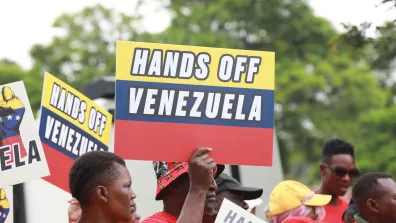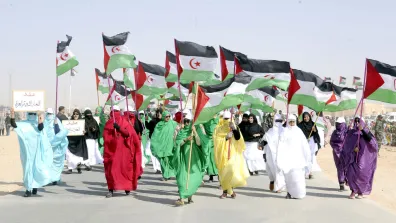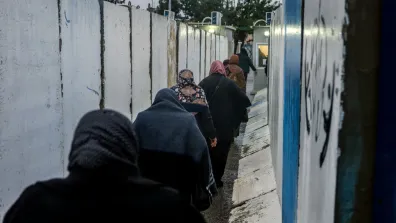Boycott, Divestment, Sanctions

The BDS call specifically invokes the legacy of international opposition to South Africa’s apartheid regime, and sets out a clear set of demands, all of which are squarely based in international law.
The BDS movement goes from strength to strength. BDS has been adopted by trade unions, student unions, faith groups, prominent writers and artists and solidarity movements from all over the world.
Boycotts can be sporting, cultural, academic or consumer, for example boycotting goods produced in Israel’s illegal West Bank settlements.
Divestment campaigns target companies complicit in Israel’s oppression of Palestinians, including those supplying Israel with arms and equipment used in Israel’s militarised repression of Palestinians. Sometimes divestment campaigns target institutions such as universities or churches, to ensure that investments or pensions funds are not invested in such companies.
Sanctions campaigns are designed to pressure governments to fulfil their legal obligations to hold human rights abusing countries to account through military embargoes or by suspending trade deals. War on Want’s call for a two-way arms embargo on Israel is an example of a sanctions campaign.
BDS for equality and justice
Boycott, Divestment and Sanctions is a set of tactics providing a peaceful way for people to campaign for human rights, justice and accountability. These tactics have been used effectively in a wide range of situations, notably during the apartheid era in South Africa when they were used to help bring about the end to apartheid.
A global grassroots movement
BDS is supported by trade unions, academic associations, student groups, charities, and grassroots movements across the world. In the UK, this includes the TUC, over 30 student unions, and dozens of NGOs and charities. Faith groups, including many Jewish groups, play an important role in the BDS movement.
Prominent artists and political figures who have spoken in support of BDS include Archbishop Desmond Tutu, Naomi Klein, Angela Davis, Alice Walker, Stephen Hawking, Ken Loach and Judith Butler. It has also been supported by the Movement for Black Lives in the United States.
Time-honoured protest tactics
BDS is a set of time-honoured tactics, used by social movements throughout history and across the world. They’ve been applied effectively to put economic, cultural or political pressure on a regime, institution or company. This has included:
- Montgomery bus boycott in the United States in 1955-56, when primarily Black Americans boycotted public buses to protest racial segregation
- Bristol bus boycott in 1963, to protest the Bristol Omnibus company's refusal to employ Black or Asian bus crews
- Boycott of Nestle products in the 1970s when War on Want exposed Nestle’s aggressive and harmful marketing of baby formula instead of breastfeeding, especially in the global South
- Boycotts of Barclays Bank in the 1980s to protest its involvement in South Africa’s apartheid regime
- Divestment from fossil fuel companies, campaigns that have swept through the US and UK at the level of universities and local councils
- Pension fund divestment from tobacco companies
- Sanctions in the form of arms embargoes against South Africa.
A legal and legitimate form of protest
- BDS is a legal and legitimate form of protest, protected by human rights law and freedom of speech, including the International Convention on Civil and Political Rights. Even those who disagree with the tactics agree that they are and must be protected, so long as they don’t break additional laws. For example:
- Prominent human rights organisations, including Amnesty International, have affirmed that individuals, associations, organisations and institutions are entitled to advocate and implement BDS in the exercise of the fundamental right of freedom of expression.
- In June 2016, the UK high court affirmed that three local councils in England and Wales were acting lawfully when they passed BDS resolutions.
- In November 2016, the High Representative of the EU for Foreign Affairs and Security Policy said the EU firmly protected the freedom of expression with regard to BDS actions carried out on EU territory.
- In December 2016, over 200 legal experts published an open letter affirming that BDS is “a lawful exercise of freedom of expression.
- In June 2017, the UK high court ruled that the government acted unlawfully in trying to restrict local councils from divesting from companies involved in Israel’s illegal occupation or other illegal activities.
Consistent with UK policy
While the current UK government states that it is opposed to BDS, such tactics are consistent with UK policy.
- The FCO has issued a warning to businesses that there are economic, reputational, and legal risks to doing business with settlements in the occupied Palestinian territory. A refusal to do business with a certain set of companies or institutions is a form of boycott.
- The UK National Action Plan on Business and Human Rights provides guidelines which should prevent businesses from complicity in human rights abuse and violations of international law.
- The FCO states that “Sanctions, such as arms embargoes…are one of the tools used by the international community to promote human rights and democracy, particularly in conflict and post-conflict situations.”
A movement against racism and oppression
- The BDS movement is, as a matter of principle and in practice, categorically opposed to all forms of racism, including Islamophobia and antisemitism.
- BDS campaigns focus on the illegal actions of the Israeli state, and on government and corporate complicity in those illegal actions. The BDS movement does not boycott or campaign against any individual or group simply because they are Israeli.
- Similar tactics are supported (when effective) to use against other repressive regimes as well, for example, the call on the UK Government to implement an arms embargo on Saudi Arabia over its war crimes in Yemen.
BDS successes
- BDS campaigns are proving to have a lasting impact – thanks to the tireless work of people of conscience around the world, major corporations and governments alike have ended their complicity in Israeli oppression.
- Orange, which once provided free telecoms services to Israeli soldiers, bowed to pressure from the BDS movement and ended their Orange Israel brand. Palestinian BDS activists welcomed this as a significant success as proof that “apartheid is bad for business”.
- BDS campaigners have secured divestment by major institutions including governments and banks. For example, Government pension funds in Sweden, Norway and New Zealand have divested from Israeli companies complicit in illegal activity in the occupied Palestinian territory.
- A sustained BDS campaign led by War on Want forced British multinational security company G4S to pull out of its operations in Israel, where it ran prison services holding and abusing Palestinian political prisoners. In 2016, G4S sold off its Israeli subsidiary company, G4S Israel.
- Veolia was a key partner in the Jerusalem Light Rail project, which links West Jerusalem to illegal Israeli settlements in the West Bank. Campaigners in the UK pressured local authorities to not renew contracts with Veolia. After years of intense grassroots mobilisation, Veolia caved and pulled out of the Israeli market in 2015, admitting that the campaign cost the company important contracts.
- In 2016, Irish corporation CRH bowed to pressure from BDS campaigners, selling off its stake in Nesher Cement, its Israeli operation. Nesher Cement supplies cement used in the construction of Israel’s apartheid Wall and illegal settlements on occupied Palestinian territory.
- In 2017, War on Want's 'Deadly Investments' report exposed banking giant HSBC's shareholdings in Elbit Systems, which sells weapons to the Israeli military used in attacks on Palestinians. In 2018, after a year of campaign pressure from War on Want and allies, HSBC divested from Elbit completely.


